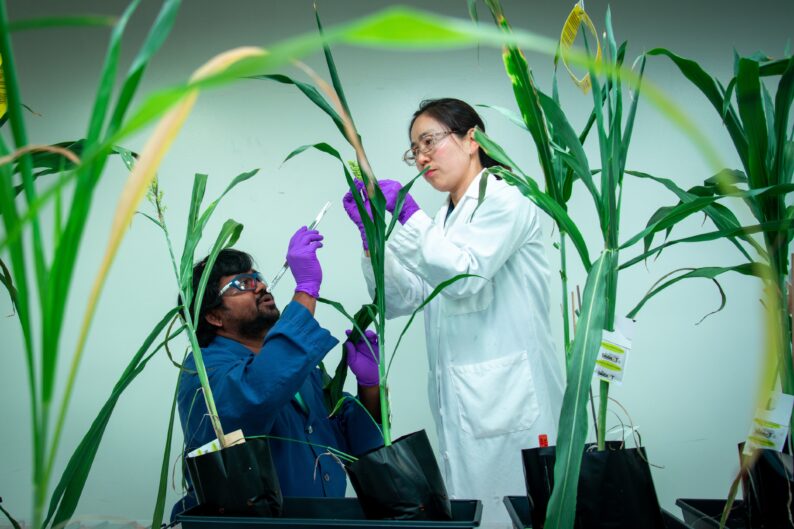By Sara Harmon
The Department of Energy’s Joint BioEnergy Institute (JBEI), led by Lawrence Berkeley National Laboratory (Berkeley Lab), was selected as one of four Department of Energy (DOE) Bioenergy Research Centers (BRC) to be awarded a combined total of $590 million to support innovative research on biofuels and bioproducts.
These new BRC awards, announced today by the U.S. Department of Energy, will kick off JBEI’s fourth five-year funding phase. “To meet our future energy needs, we will need versatile renewables like bioenergy as a low-carbon fuel for some parts of our transportation sector,” said Secretary of Energy Jennifer M. Granholm. “Continuing to fund the important scientific work conducted at our Bioenergy Research Centers is critical to ensuring these sustainable resources can be an efficient and affordable part of our clean energy future.”
Each center will initially receive $27.5 million for fiscal year 2023 with the possibility of additional funding for the next four years of the program cycle. JBEI and the other centers conduct basic science research to create biofuels and bioproducts from non-food plants. Each BRC has their own distinct research mission and programmatic goals, however, this new funding also specifically earmarks funds for all four BRCs to collaborate together on shared strategic goals.
“We are very excited that the Department of Energy has awarded us with another five years of funding to continue our path-breaking research,” said Jay Keasling, JBEI’s chief executive officer. “This work will enable the cost-effective production of carbon neutral biofuels and carbon negative bioproducts from lignocellulosic biomass. Usage of these fuels and products will reduce the nation’s dependence on fossil fuels while significantly reducing the amount of carbon added to the atmosphere and contamination of the environment.”
JBEI was established in 2007 by the Office of Biological and Environmental Research within DOE’s Office of Science along with the Center for Bioenergy Innovation, led by Oak Ridge National Laboratory and Great Lakes Bioenergy Research Center led by the University of Wisconsin—Madison in partnership with Michigan State University. The Center for Advanced Bioenergy and Bioproducts Innovation, led by the University of Illinois Urbana-Champaign, was added in 2017.
In addition to Berkeley Lab, JBEI’s partner institutions are the University of California (UC) campuses at Berkeley, Davis, San Diego, and Santa Barbara; Iowa State University; the Georgia Institute of Technology; Northwestern University, the University of Adelaide in Australia, Sandia National Laboratories; the Pacific Northwest National Laboratory; Lawrence Livermore National Laboratory, and Brookhaven National Laboratory.
Since its founding fifteen years ago, JBEI research has produced 1,093 peer-reviewed publications, 120 patents, 176 technology licenses, and 12 startup companies. JBEI has long been a leader in establishing technologies that propel the U.S. bioeconomy forward in a competitive market. JBEI has made several significant scientific achievements in its prior funding phase, including:
- Discovery of advanced feedstock agnostic biomass pretreatment solvents, such as ionic liquids and deep eutectic solvents. This included demonstrating a one-pot integrated ionic liquid-based biomass conversion technology that processed mixed woody biomass at a 1500-liter scale, validating the commercial feasibility of the technology by achieving an overall conversion efficiency from biomass to a biofuel of nearly 80%.
- Creating new biosynthetic routes to advanced sustainable fuels for aviation and rocket fuel by harnessing the modular nature of polyketide synthases to develop new biosynthetic pathways that when expressed in bacterial hosts, convert sugars to polycyclopropanated fatty acid methyl ester (POP-FAME).
- Engineering sorghum, switchgrass, and poplar to reduce lignin and other compounds that make them hard to break down while retaining the plants’ health and ability to grow. Some plants have also been engineered to produce value-added compounds that can be used to produce useful products such as renewable polymers and biodegradable plastics.
- Developing a new framework to determine how much accumulation of value-added products in planta compensates for the costs of extraction.
In recent years, biomanufacturing (the biological production of fuels, products and components that are traditionally made through chemical processes) has become a vital part of the U.S. strategy to create sustainably produced and consistent supply chains. The recent National Biotechnology and Biomanufacturing Initiative also establishes this national priority as a means to introduce new industries and employment opportunities in the U.S.
Biomanufacturing also holds significant promise to resolve multiple problems at once. JBEI recently partnered with Berkeley Lab’s Advanced Biofuels and Bioproducts Process Development Unit (ABPDU) and the California Energy Commission to develop a process that could convert forest debris and agricultural waste into usable fuel. These technologies are currently undergoing pilot testing and could be available for wider roll-out in the near future.
California is a recognized leader in the biotechnology sector and is well-poised to ramp up biomanufacturing in the state as a complementary industry in agricultural regions such as the Central and Imperial Valleys. JBEI is working on technologies to convert forest thinnings generated by healthy forest efforts, bioenergy crops, farm residues, and other biomass wastes into high value bio-based products and sustainable aviation fuels. This could offer new economic opportunities for farmers and rural communities in California, and throughout the west, and an opportunity to diversify and strengthen local economies. JBEI collaborates with farmers and rural industry in California to conduct studies of sorghum and other bioenergy crops in field tests.
JBEI is a well-known leader in developing the bioeconomy workforce of the future and partners with many organizations to host students, industry trainees, and postdocs at their Emeryville, CA headquarters. This proximity to the hub of the burgeoning biomanufacturing industry also makes JBEI alumni well-sought after for employment in the field. JBEI also organizes the annual Introductory College Level Experience in Microbiology (iCLEM) – a paid summer science intensive and college preparation program for under-resourced Bay Area high school students.
“JBEI partners with many universities and organizations around the country to train the diverse bioeconomy workforce of the future to steward a better planet,” said Keasling.
This feature was originally published on the Berkeley Lab News Center.
